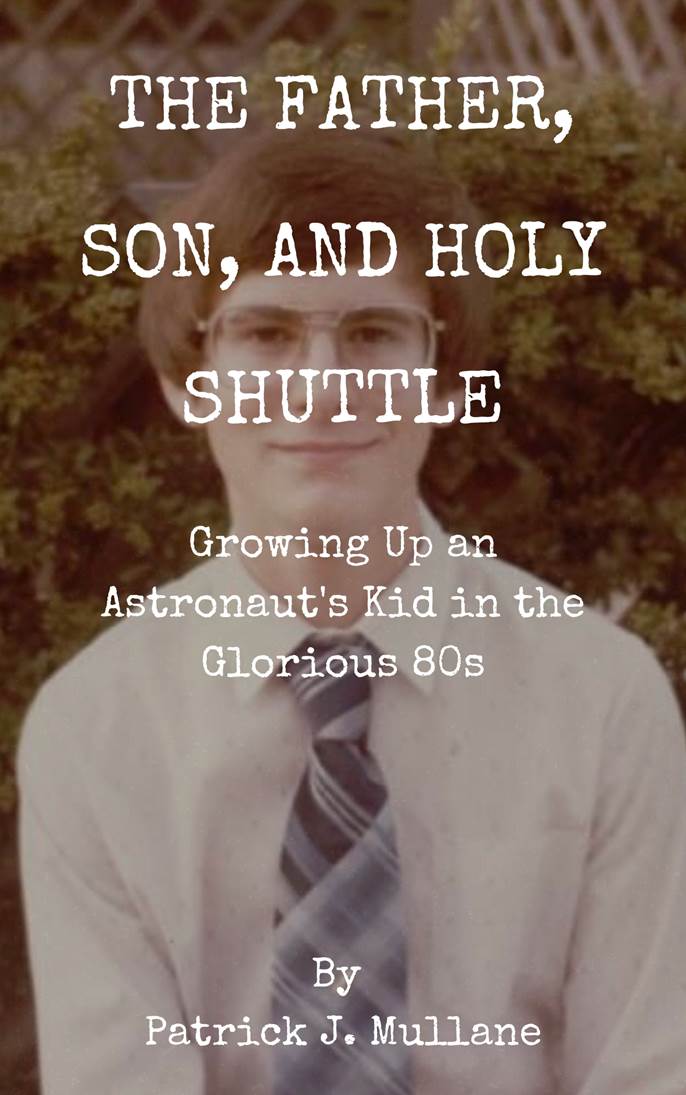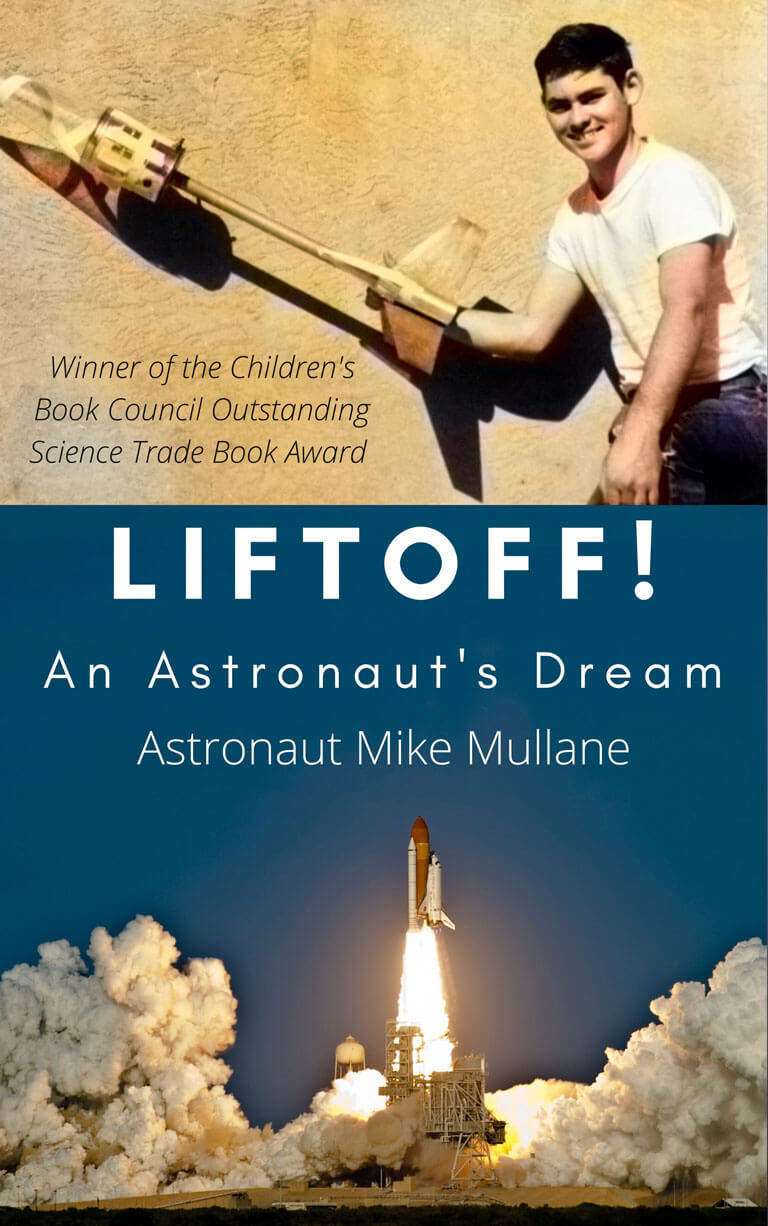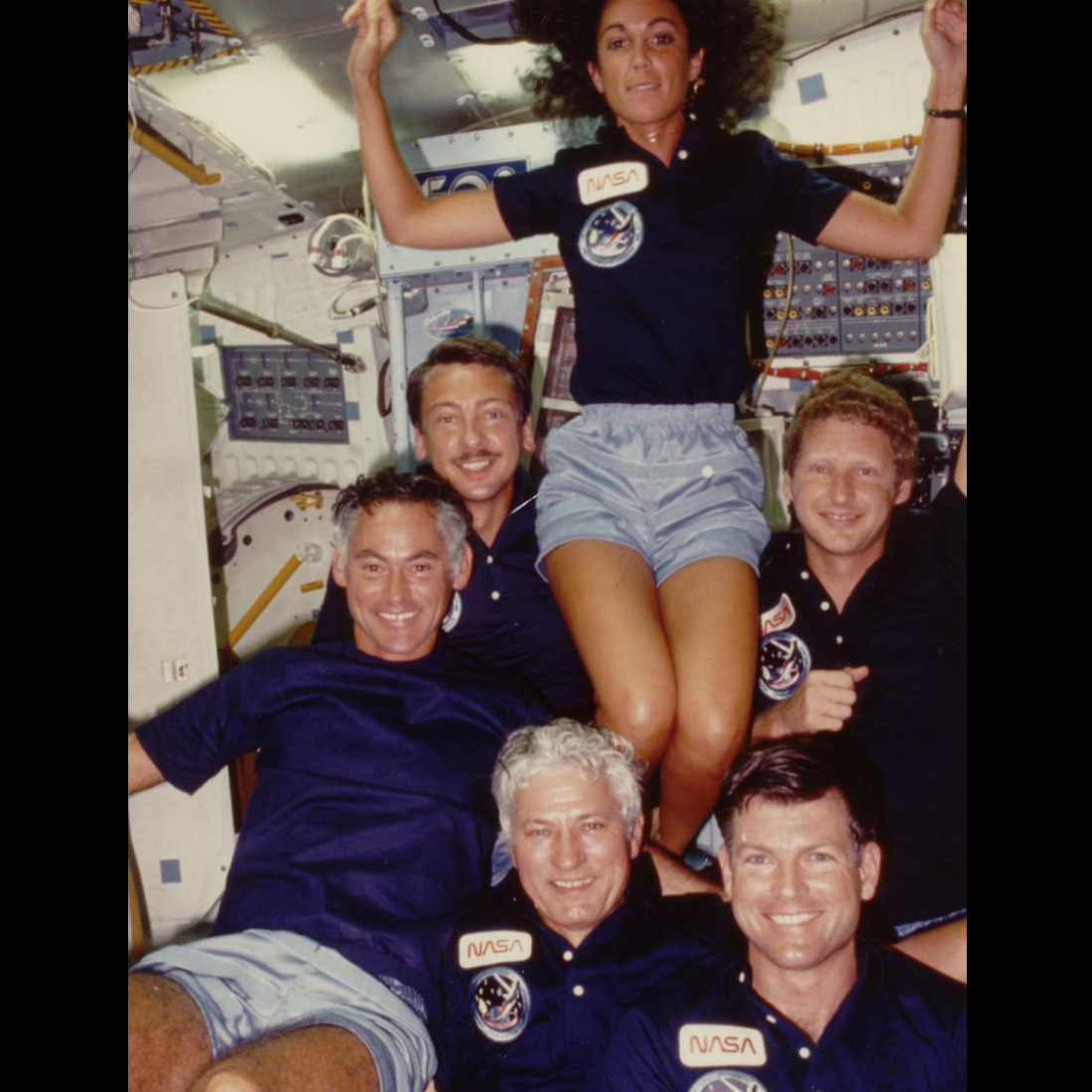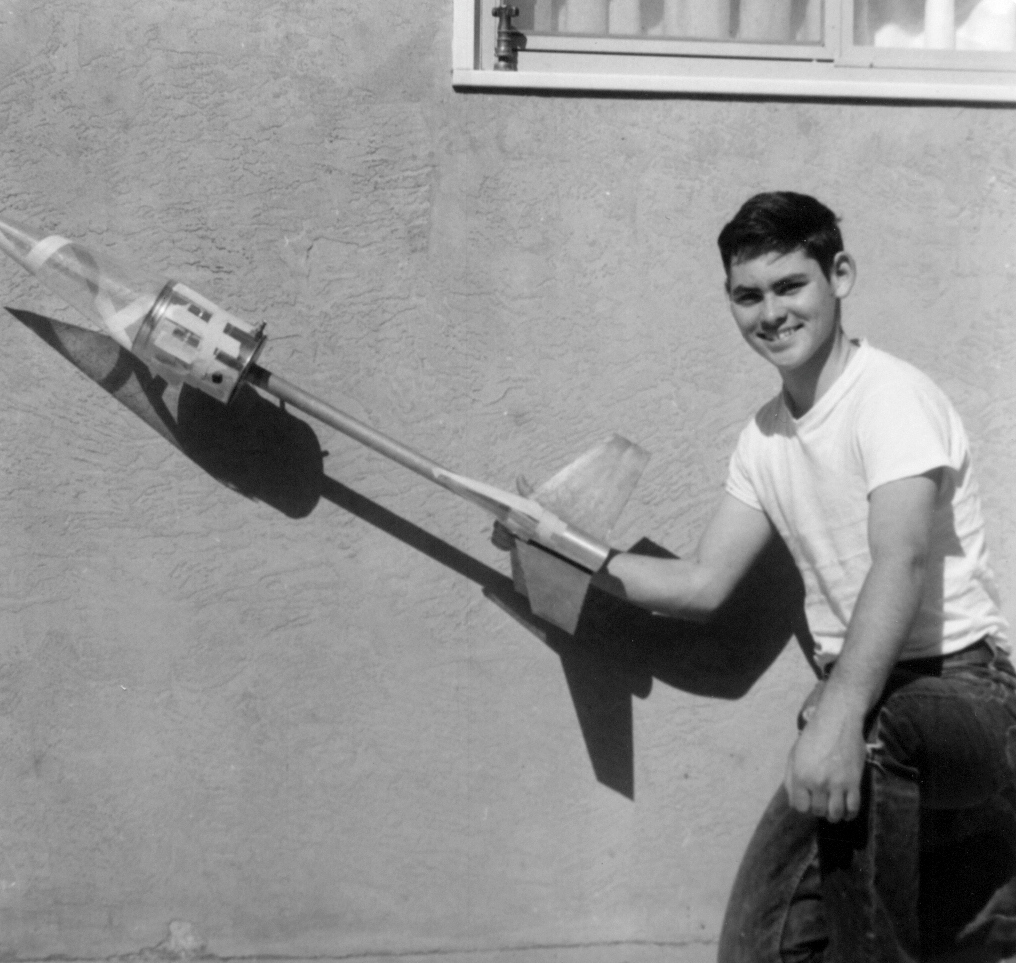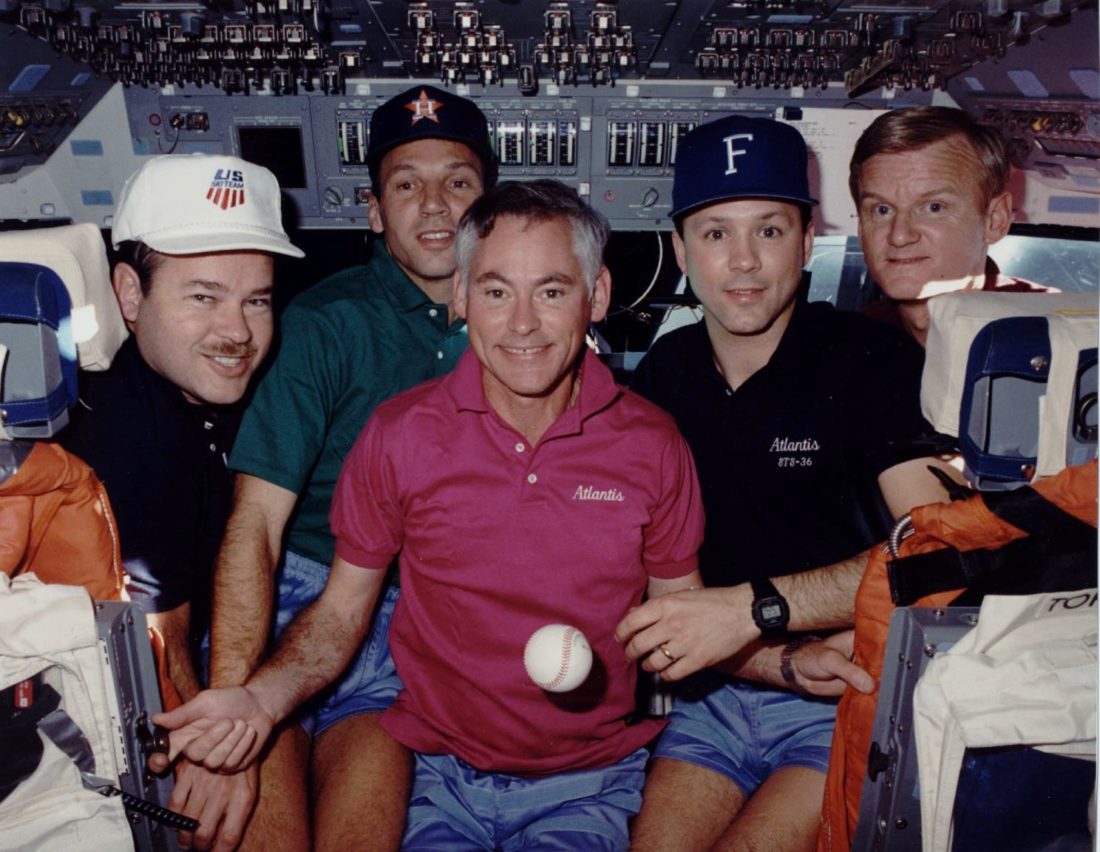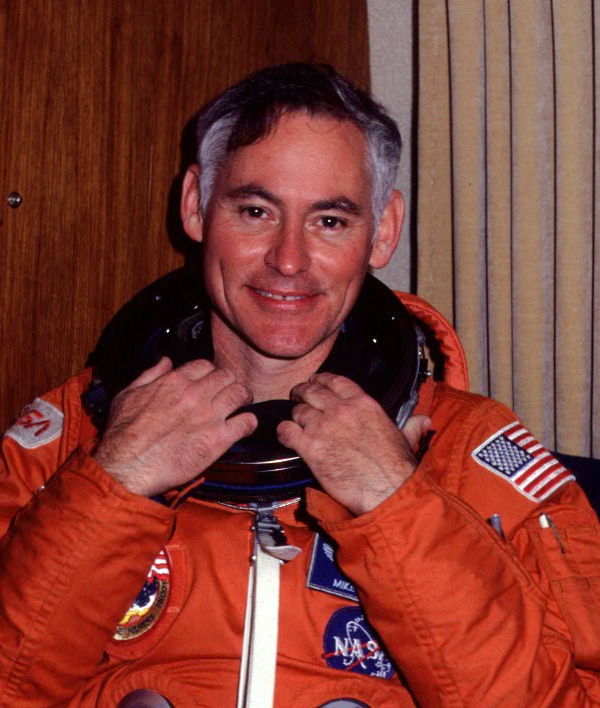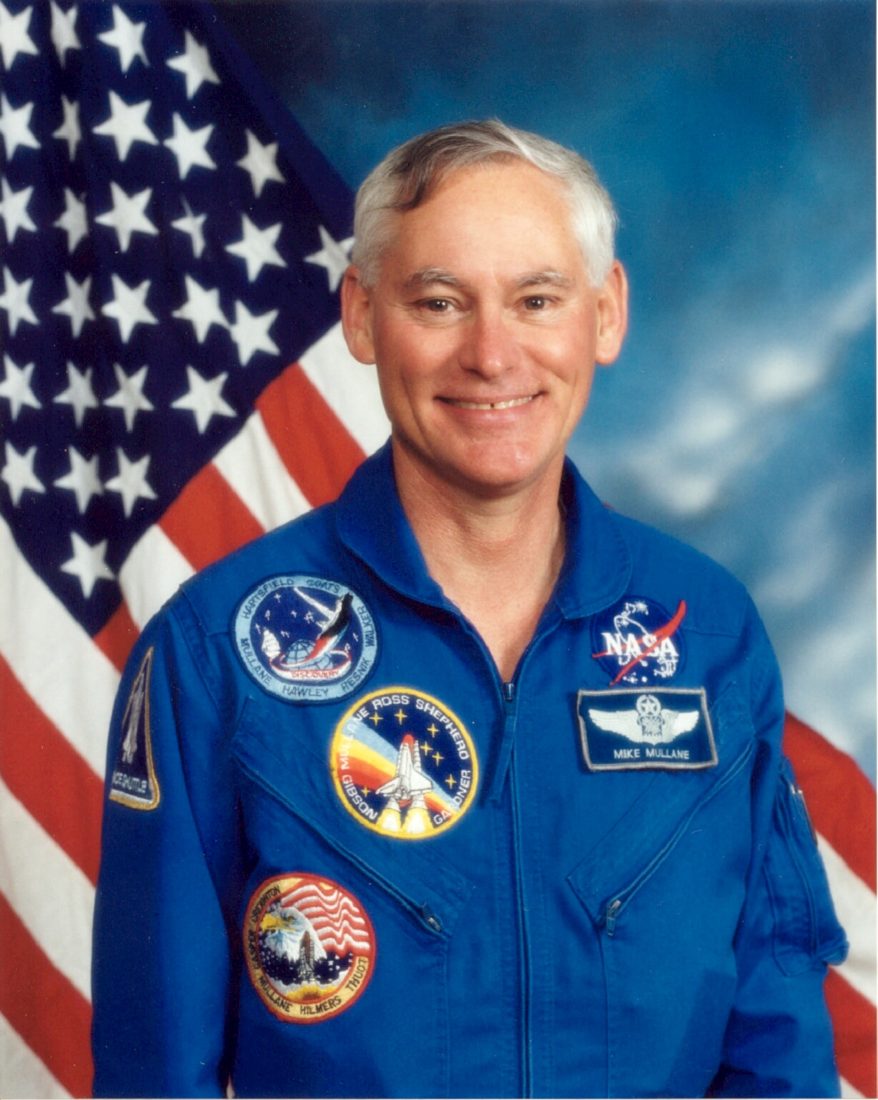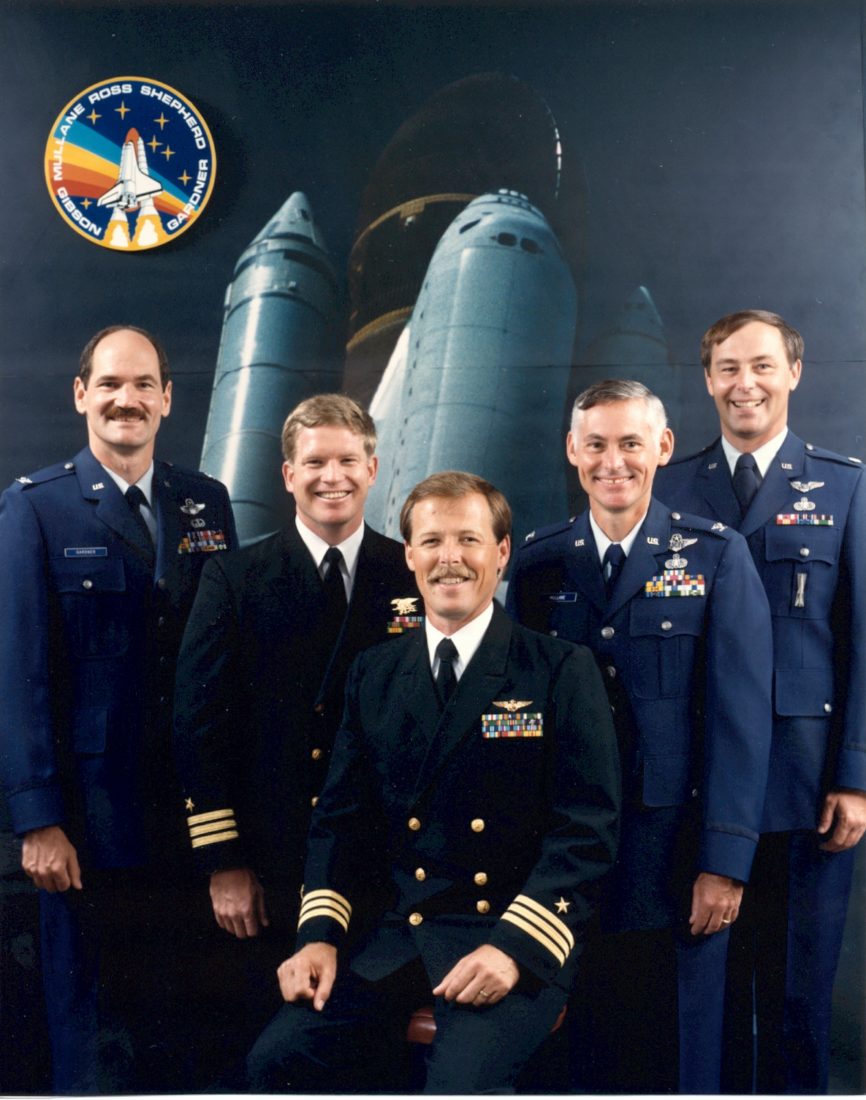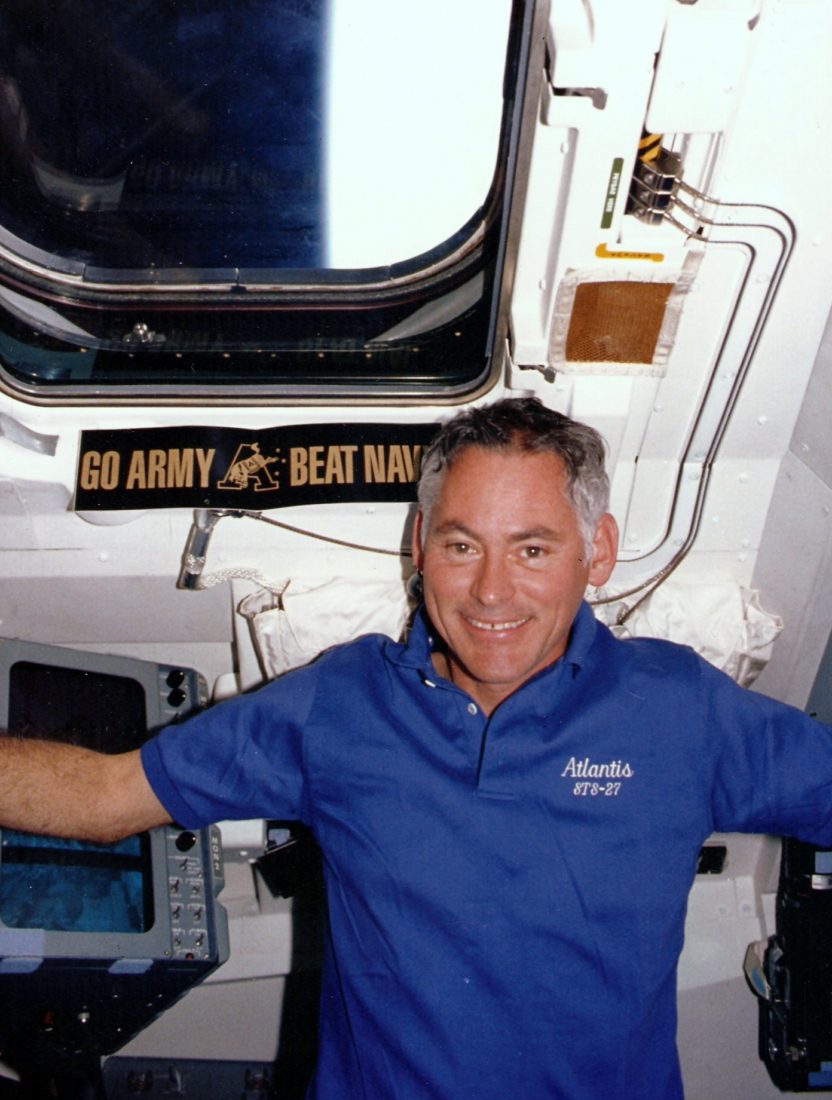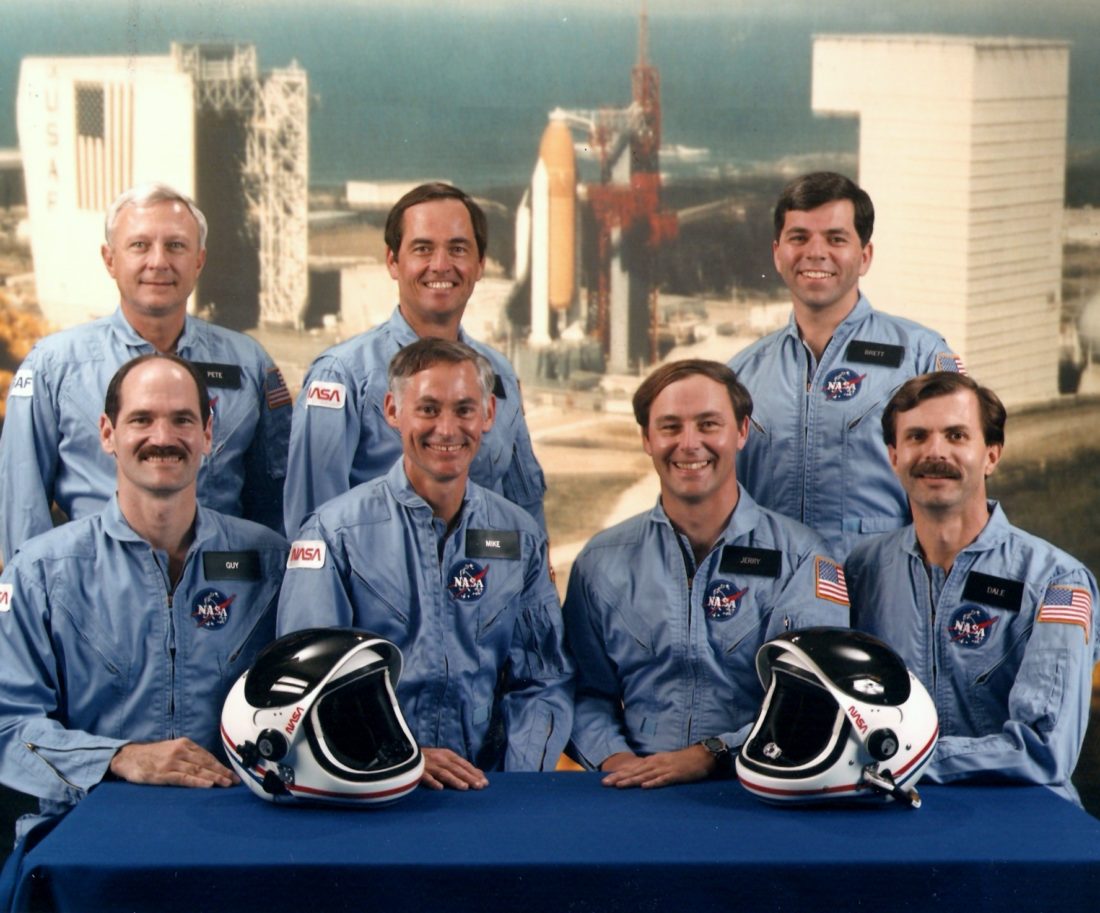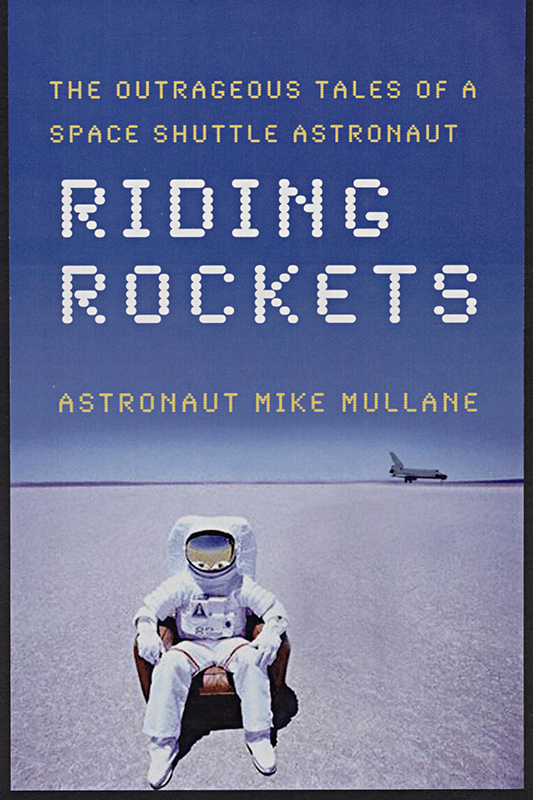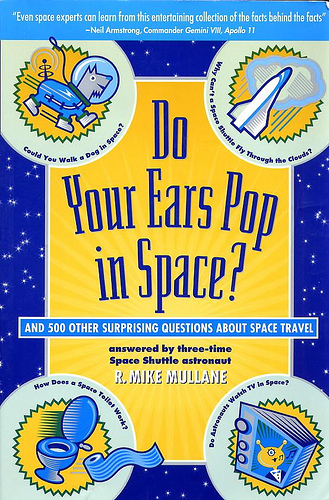by R. Mike Mullane (NASA Astronaut, Ret.) © 2017 All Rights Reserved
Author, Riding Rockets, the outrageous tales of a space shuttle astronaut.
Autographed copies can be ordered via Mullane’s website store: www.MikeMullane.com
Recently, as I was sitting at my desk, my wife came to me, leaned down, put her arms around me, kissed the top of my bald head and said, “You’re a good man.”
In the foggy past, that moment might have led us into the bedroom. At age 72, though, I can assure you bedroom romps are no longer so spontaneous. But the effect on me of that moment prompts this blog. While the whole episode didn’t last more than five seconds, I was immediately filled with a warm sense of contentment, happiness and purpose. And that feeling persisted for the rest of the day. In fact, it changed my day from ordinary to wonderful. I felt so valued and appreciated. I excelled at everything I did.
I suspect everybody in a healthy marriage can share similar stories. So, why such a significant output from such an insignificant input? To answer that question, I will travel to the font of all knowledge…the Web. Here’s the answer I thought best:
“It is an absolute human certainty that no one can know his own beauty or perceive a sense of his own worth until it has been reflected back to him in the mirror of another loving, caring human being.” – John Joseph Powell, The Secret of Staying in Love
Wow! I wish I would have said that.
Mr. Powell’s sentence perfectly describes what I experienced. As much as I would like to think I was a good man, telling myself that meant nothing. It was only when that observation was reflected back to me by my wife, that it took on meaning. Donna’s five second hug, kiss and words filled me with a sense of my own worth…just as Mr. Powell so eloquently describes. And that sense of worth stayed with me long after the moment and put me at the top of my game.
Now, to the topic at hand, i.e., taking our humanity to Mars.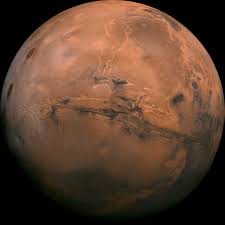
Could I forego moments, as I just described, for years, while sealed in a small volume with four or five other people, coasting along as a mote of life 20 million miles from Earth? No. I could not. I would miss those moments of intimate affirmation, even though they are completely non-sexual. For me, it is a high-order need; something I could not willingly set aside for multiple years.
Am I all that different from other people? I doubt it. To be at the top of our games, most of us need to occasionally see our worth reflected in the eyes of another loving, caring human being.
So, if it is a high-order need for humans to effectively perform well, how will the need for human intimacy be addressed for a Mars mission?
First, let’s look at the scope of such a mission. NASA’s website gives the duration of a round-trip to the Red Planet as one to three years. The shorter end of that range would require some version of exotic, propulsion technology, something not likely to be available in the 2030’s (NASA’s current Mars timeline). The longer time would be with current propulsion technology. I think the first Mars trip will be toward the longer end of that duration spread, but let’s just assume there is some new tech available which shortens the trip to two years.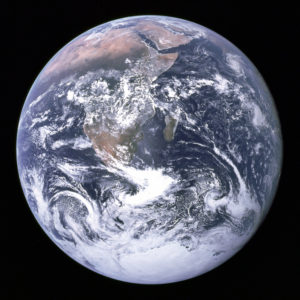
I couldn’t find any specific number on crew size, other than it won’t be large. Remember, when the Mars mission leaves the vicinity of Earth, it must have aboard food, water, oxygen, tampons, toilet paper, toothpaste…virtually everything you will use today in your lives, for a two-year period for every crew member. Adding more people, requires more of these consumables, which adds more weight, which requires more fuel for propulsion, which requires a bigger rocket…you get the picture. So, let’s assume 4 to 6 people will form the Mars mission crew.
Another assumption can be made about the age of those crewmembers…probably late 30’s to 50 years old.
And what about the size of the Mars spacecraft? I couldn’t find anything definitive on NASA’s website about this, but we can make some wild guesses. The ISS is occupied by an average of six astronauts and has a living area of about one-half of a 747 passenger cabin. Its total mass is a little less than a million pounds. On a trip to Mars, less will be more when it comes to mass, so I think the living area will be less than that of the ISS. But let’s assume otherwise…that it will have the same one-half of a 747 cabin living area.
A quick recap of our assumptions: four to six people, approximately 35 to 50 years old, will be locked in a half portion of a 747 cabin for a minimum of two years. (Sounds like one of the family vacations from my childhood, except then, it was a 1956 Pontiac station wagon with two adults, six kids and two dogs.)
To these assumptions, let’s throw in the need for human intimacy. A search on NASA’s website under “human intimacy on long duration spaceflights” revealed nothing on that topic. Perhaps NASA is going to ignore that factor in crew selection. But I doubt it. The NASA I knew never left anything to chance. We even had a toilet trainer with an upward pointing video camera and TV monitor to check our alignment with the solid-waste collection tube. No, I think the subject of taking our humanity to Mars (including our need to occasionally receive affirmation from a loving, caring fellow human being) is probably being addressed, if currently at a low level of study. Some experts in the psychology/psychiatric community have probably been or will be enlisted to provide some help with this topic.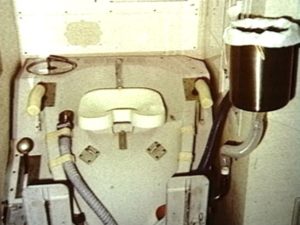
In the end, what answer will they give? In my musings about that question, the first answer to come to me would be to select 2 or 3 married couples for the trip. Problem solved, right?
Not so fast. Given that a Mars mission crew would have been selected by NASA to the astronaut corps a decade or more prior to the actual mission, that means a criterion for that class selection would have specified applicants must apply as a pair of married scientists/engineers/pilots, or achieve such status later, to compete for a slot to Mars. Oh, and by the way, you have to sign a contract you must remain wildly in love throughout a Mars mission.
Another problem with the married couple idea is children. Imagine a couple with minor children left back on earth. Halfway to Mars MCC calls, “Your son has been killed in an accident.” Or, “Your daughter needs a kidney. You were probably the only hope of a quick, life-saving match.” What would calls like that do to mission success? Clearly, they could be disastrous.
So, now the criteria for selection of an all married crew shrinks even tighter: “If you want to go to Mars, you cannot have minor children.”
(Frankly, as a father and grandfather, I wouldn’t think much of a couple who could abandon their minor children for years to join a mission with great potential to kill them and leave their children orphaned. I would find it difficult to see them as friends.)
How many laws do you think are violated by requiring applicants for a US federal job to be married to an engineer or scientist (or later get married to such a person), have no minor children, and to give a sworn statement of enduring love? That has lawsuit written all over it.
There is yet another problem with married crews. Do they also have to swear celibacy for the duration of the mission? While I introduced this blog with a moment of non-sexual intimacy between my wife and me, let’s face the facts. Those moments can, do and, frankly, should occasionally lead to the ultimate human intimacy…sex.
While us septuagenarians could probably do two years without sex, I think it’s unrealistic to imagine normal, healthy people 35-50 years in age, in committed relationships signing up to do so.
And now we stray into the question on everybody’s mind…can sex even occur in weightlessness? Yes. Our bodies work the same up there as they do down here. In fact, for males they work better. As I describe in my memoir, Riding Rockets, weightlessness induces a Viagra effect on males. And female astronauts have had periods in space. Everything in that department seems to work just fine in weightlessness. Newton’s third law might be a momentary challenge…for every action, there’s an opposite and equal reaction. But, when it comes to sex, we humans are incredibly skilled problem solvers. While I don’t believe sexual intercourse has ever occurred during a space flight…certainly not on a space shuttle mission (there’s no privacy)…it will definitely occur someday. In fact, if we are serious about human colonization of space, it must occur. (Long into retirement some NASA couple will probably claim that footnote in history, unless a pair of space tourists beats them to it.)
But heterosexual sex adds the danger of a pregnancy. What kind of birth control is 100 % effective? Answer: None. An “oops” like that would be a disaster on a flight to Mars. Remember, adding another crew member through a birth means more oxygen, water, food, etc., being consumed…which you don’t have. Maybe another criterion for Mars mission selection would be sterilization. Another lawsuit there. As a backstop to a failure of normal birth-control, a morning-after pill could be employed. But that’s not without its own danger to the woman. Also, if known that tax payers were footing the bill for a morning-after pill, the gates of NASA would be stormed by a significant population of outraged Americans.
The dangers of pregnancy begs the question…What about a crew of gay couples? By the time NASA selects a Mars crew, there might be openly gay astronauts in the corps. A gay crew does away with the pregnancy issue…but probably at the expense of a different part of the US population being outraged.
In the entire discussion so far, I have assumed only an American crew, which will certainly not be the case. Given the money it will be contributing to a Mars mission, the European Space Agency will certainly have their astronauts represented on the trip. Perhaps the Russians and Japanese, too. How will they address the emotional needs of their astronauts/cosmonauts? I imagine there are cultural differences in those needs. Would their selections be a “fit” with NASA’s selections of American astronauts?
What other options are we left with? Maybe some in the psychology community will say a 50-50 ratio of males and females is a terrible choice. Maybe 70-30 or 10-90 or some other combination is better. Maybe the best is a mix of married and single men and women, gay and straight and let nature takes its course. Anybody think that will work? I don’t. When it comes to high-order, human emotional needs, nature’s course can sometimes create destructive jealousies, envy, anger, heartache, depression…things that could be disastrous on a Mars trip.
No matter what crew combination I can think of, it comes with a host of new problems. Imagine being the only single guy on a two-year mission and having to confront a married pair of your crewmates (or singles who have bonded as a couple during the flight) drifting from the airlock with a certain satisfied glow on their faces. Before the mission is over, that lone single guy will be clawing at the walls.
In my opinion, determining the optimum crew composition, with an eye toward accommodating our humanity, is not something solvable with simulations…something that NASA is World Class at doing for other crew training issues. How do you simulate a multi-year Mars mission? We humans are infinitely variable within ourselves by time and by circumstance. Each crew member going to Mars will be a different human at the 18th month point than they were at the 6th month point. And they will be different humans if something goes amiss and introduces a greater fear factor.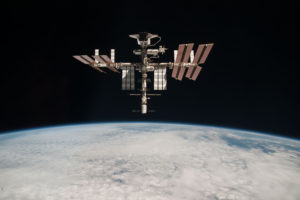
NASA’s plan to address this reality is to do longer and longer International Space Station missions and then move the same experiment to lunar orbit. While such baby-steps will answer a lot of questions about how our physical bodies are affected by long term weightlessness, I think any observations made on human emotional needs would be of limited value. Certainly, I think any ISS psychological data would be marginally helpful, primarily because of the Space Station’s proximity to Earth. On my three shuttle missions I never felt disconnected from Earth. It was hugely close, filling the windows, just as it does on the ISS. In fact, I could occasionally see my home town, just as those ISS astronauts can do.
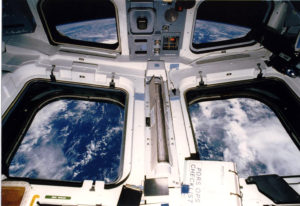 While my missions were very short (longest was six days) and I’ve never been in lunar orbit, I suspect the same calming sense of proximity to home remains for both long duration ISS and lunar orbit missions. Contrast being 270 miles (ISS) or 240,000 miles (lunar orbit) from home, to being 46,000,000 miles and 18 months away from everything you’ve ever known (a Mars mission). I think the psychology of human emotional needs will vary greatly not just as a function of mission duration, but also as a function of Earth proximity.
While my missions were very short (longest was six days) and I’ve never been in lunar orbit, I suspect the same calming sense of proximity to home remains for both long duration ISS and lunar orbit missions. Contrast being 270 miles (ISS) or 240,000 miles (lunar orbit) from home, to being 46,000,000 miles and 18 months away from everything you’ve ever known (a Mars mission). I think the psychology of human emotional needs will vary greatly not just as a function of mission duration, but also as a function of Earth proximity.
Another problem with using ISS and cis-lunar long duration psychological data is that the crew members involved might be very reticent about revealing their true feelings, particularly if they want to be considered for the first Mars mission. I saw this in the shuttle era, where crew members who experienced space sickness (nausea, vomiting), were extremely reluctant to mention it to the Flight Surgeons for fear of that fact being used against them in future flight selections. Would a crew member on a long duration ISS or cis-lunar flight tell the Flight Surgeon, “I occasionally cried myself to sleep holding a picture of my family”? Or, would they reveal a thought along this line, “If I had spent another minute with that jerk, I would have locked him in the airlock and depressurized it”? I doubt that type of honesty would be forthcoming for crew members who want to be in line for the first Mars mission.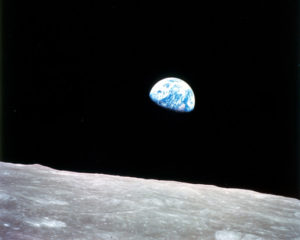
All solutions to taking our humanity to Mars will carry risks. Maybe there’s a group of very smart people out there who can come up with a solution, but I think any solution will end up being the least worse solution. Then, again, maybe I’m completely full of crap on this topic. Maybe it is a complete non-issue. We astronauts are exceptionally good at capping our emotions. In how many interviews did I lie and say I was never afraid on a shuttle mission even while still feeling the lingering ache from fear-induced ass-clenching? And NASA always has the option of crewing a mission with astronauts who are so far out on the bell-curve of human needs, as to be robots. I’ve met some of those…true Sheldon Coopers’ (a physicist character on the TV sit-com ‘Big Bang Theory’ who loathes all human intimacy). I recall some of us TFNGs (my class of astronauts) joking among ourselves about an astronaut from an earlier class. He wasn’t human, we all agreed. Rather, he was an alien life-form, kicked off the mother-ship and left with us by his pissed-off crewmates because he was so irritatingly detached from his own species.
I’m certain NASA could go with that option and crew a mission with those negative 6-sigma humans, although I suspect a half-dozen of those types, locked up for 2 years in a spacecraft, would make the Hunger Games look like a picnic.
I’ve often said, all the engineering challenges posed by a human Mars mission…and they are legion…will be solved. NASA is the repository of the best engineering minds in the world. Give them enough time and money and they will find those answers. But, the truly great challenge will be finding the best crew composition to accommodate our very humanity.
At this point, you must wonder…Why even bother with a human Mars mission? Humans are a mess to deal with.
Good question. Any job those first Earth-Martians do, could be done with a robot at a fraction of the cost, in a fraction of the time and at no risk to human life. Sounds like the way to go. What possible justifications could there be to press ahead with human spaceflight to such great distances?
Species survival comes to mind. Our days are numbered. Perhaps our own folly will end us. Or, the end will come at Nature’s hand with a cosmic impact or a pandemic. If, by some miracle, we dodge all those bullets for another billion or so years, the dying Sun will definitely turn out the lights on humanity. Many people might say, “Not my worry.” I doubt, though, our progeny would appreciate that attitude. A human Mars trip will be the first tiny step in perhaps someday leaving them the ultimate legacy….an option for species survival; an option to colonize another planet in another star system. Sure, right now that’s the stuff of science fiction. But, in my youth, so was the idea of human’s walking on the moon.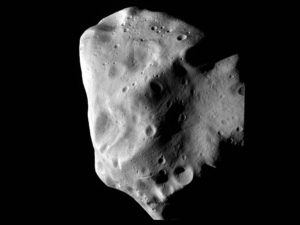
And there’s another justification for dealing with the mess that is our humanity and extending our human exploration to Mars and beyond. It’s hardwired into our DNA to do so. We humans have always rushed to embrace heroic adventurers…Lewis and Clark, Amundsen, Lindbergh, Earhart, Markham, Yeager, Armstrong, to name only a few. That’s not by accident. We live vicariously through them, imagining ourselves in their skins, facing the dangers they faced, seeing the pristine beauty they saw, experiencing the joy they felt. The most sophisticated robot can send us terabytes of data, but you’ll never hear it describe the emotions it felt when its camera eye saw the first imprint it had made on an alien planet. Yet, we yearn to hear the representative of our species describe her feelings at the moment she looked down at the first human footprint…her booted footprint…left in the Martian soil.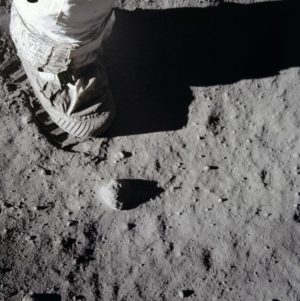
Not convinced? Quick….There are two movies playing in the same cinema. One is Martian, staring Matt Damon. The other is Martian, staring Wall:E? You’ve only got money for one ticket. What movie are you going to see?
Though I doubt it’s needed, here’s absolute, quantitative proof of the profound differences in how humans respond to robotic and human exploration. In 1966, a minuscule fraction of the world population (I was in that fraction) was aware of and swept up with news of the Russian Luna 9 soft-landing on the moon and its transmission of the first ever photos taken from the surface of an alien world. 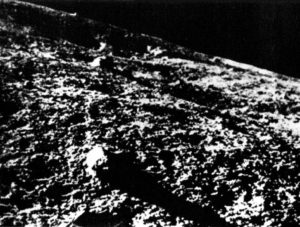 But I’ve never had anybody ask me, “Where were you when Luna 9 landed? I remember it like yesterday!” Three years later, July 21, 1969, an estimated 20% of the world’s population watched live, as Neil Armstrong became the first human to set foot on the moon. Think about it. Both the Luna 9 and Apollo 11 landings were remarkable human achievements, but only one of these events, the Apollo landing, spoke to our very hearts and indelibly marked the memories of the hundreds of millions of adults who were watching. They can tell you exactly where they were when they heard, “That’s one small step for (a) man, one giant leap for mankind.”
But I’ve never had anybody ask me, “Where were you when Luna 9 landed? I remember it like yesterday!” Three years later, July 21, 1969, an estimated 20% of the world’s population watched live, as Neil Armstrong became the first human to set foot on the moon. Think about it. Both the Luna 9 and Apollo 11 landings were remarkable human achievements, but only one of these events, the Apollo landing, spoke to our very hearts and indelibly marked the memories of the hundreds of millions of adults who were watching. They can tell you exactly where they were when they heard, “That’s one small step for (a) man, one giant leap for mankind.”
No matter the pain of dragging our humanity to Mars, there is something in our DNA that leaves us no choice. When that woman (or man) first steps from a ladder onto Marian soil, it will momentarily scratch that timeless itch of exploration that burns in our species’ spirit. I say “momentarily,” because soon after that first human footprint is left on Mars, the itch will return and our species will be looking for another, further destination.
Human exploration is in our DNA. We cannot NOT do it. So, let’s get on with it. On to Mars!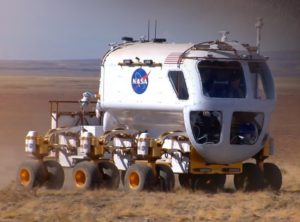
Taking Our Humanity to Mars
by R. Mike Mullane (NASA Astronaut, Ret.) © 2017 All Rights Reserved
Author, Riding Rockets, the outrageous tales of a space shuttle astronaut.
Autographed copies can be ordered via Mullane’s website store: www.MikeMullane.com
All photos, other than personal family photos are courtesy of NASA.

